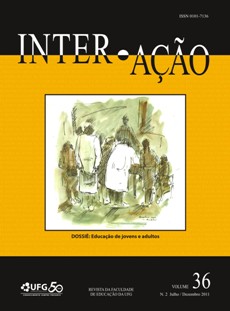TENSIONS REFLECTED IN THE THINKING OF TEACHERS ABOUT THE YOUTH AND ADULT EDUCATION CURRICULUM
DOI:
https://doi.org/10.5216/ia.v36i2.16720Keywords:
Educação de Jovens e Adultos, Currículo, Reflexão, MulticulturalismoAbstract
The aim of this article, the result of a research project financed by CNPq, is to understand the concepts of school curriculum held by Primary and Secondary School teachers in the Education of Young People and Adults (EJA), linking them to multiculturalism. To achieve this goal, a brief historical outline of EJA and its different approaches is presented. Then there is a reflection on the school curriculum and its meanings, as well as a dialogue with EJA teachers. Data was collected from the teachers by means of semi-structured interviews. As a result of the research it can be seen that the EJA teachers present important elements for a proposed critical curriculum, mainly through their concern to contextualize the subject content used in the classroom..Downloads
Downloads
Published
How to Cite
Issue
Section
License
Inter-Ação uses the Creative Commons Attribution 4.0 License for Open Access Journals (Open Archives Initiative - OAI) as the basis for the transfer of rights. Open access means making documents available on the Internet free of charge, so that users can read, download, copy, distribute, print, search, or link to the full text of documents, process them for indexing, use them as input data for software programs, or use them for any other lawful purpose, without financial, legal, or technical barriers.
Authors publishing in this journal agree to the following conditions:
1) Authors retain copyright and grant the journal the right of first publication, with the work simultaneously licensed under the Creative Commons Attribution License, which permits redistribution of the work with attribution and first publication in this journal.
2) Authors are permitted to enter into additional, separate agreements for non-exclusive distribution of the version of the work published in this journal (e.g., for publication in an institutional repository or as a book chapter), with attribution and first publication in this journal.
3) Authors are permitted and encouraged to publish and distribute their work online (e.g. in institutional repositories or on their home page) at any time before or during the editorial process, as this may generate productive changes as well as increase the impact and citation of the published work.















